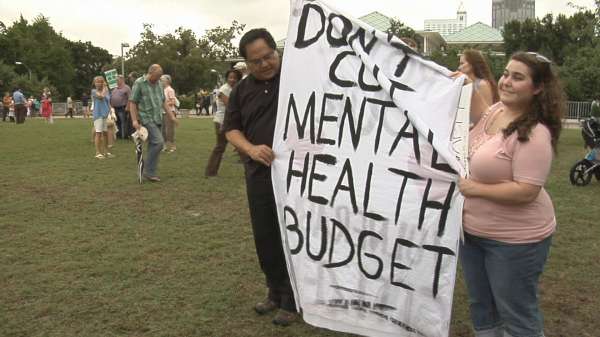It has been a year since the Newtown shootings when a severely deranged boy walked into an elementary school and started shooting children. He killed 28 people including his mother and himself. At the time, there was a lot of talk about increasing gun control laws–I even wrote about it myself–and the shoddy state of mental health services in the United States.
As expected, the uproar died away. Some states did increase funding for mental health services, but then sequestration and government shutdowns and budget priorities happened. A few days ago, the administration promised $100 million for mental health services. It was a nice gesture, but it didn’t even come close to replacing what was cut.
From publichealthfunding.org: “States have already cut mental health budgets by a combined $4 billion over the past three years–the largest single combined reduction to mental health spending since de-institutionalization in the 1970s. Cuts enacted by sequestration are estimated to reduce discretionary funding from 7.5 to 12 percent across the board.”
While politicians went all blustery and emphatically fist bangy about increase to mental health services, they actually continued to do the opposite. $100 million in the face of cuts of over $4 billion isn’t going to do much.
Here in California, where I live and used to receive state mental health services (Yes, that’s right. Used to. They cut me because I have a job even though I don’t have insurance), “nearly 1 in 6 California adults has a mental health need, and approximately 1 in 20 suffers from a serious mental illness that makes it difficult to carry out major life activities. The rate among children is even higher: 1 in 13 suffers from a mental illness that limits participation in daily activities,” according to the California Healthcare Foundation. Yet, “about half of adults and two-thirds of adolescents with mental health needs did not get treatment.”
So, you can’t tell me that mental health services are improving, because they are clearly not. There are hundreds of thousands, maybe millions, of Americans who suffer from some sort of mental illness and most go untreated. The reason is twofold.
First, it is the very nature of mental illness to not seek help. Mental illnesses don’t want to be treated. They are the voices in our heads. Our mental illnesses scream inside us that we are broken and should stay that way. They don’t want help because it means they will go away. They will do everything they can to convince us not to get it.
I didn’t get help until it was forced upon me by my friends. My PTSD and Major Depressive Disorder had gotten so bad that I cried all the time and couldn’t get out of bed.
Second, it’s not exactly easy to get help. When I sought out treatment, I was unemployed. I went to the State of California Mental Health Services. They gave me an appointment miles away from where I live even though there was a comparable location just down the street.
From the first phone call until I filled a prescription for antidepressants, it took seven months to get help. That was seven months of severe depression that I went without any help at all.
They charged me the absolute maximum for services even though I was unemployed. I paid the state of California over $1000 for a year’s supply of medication and four fifteen-minute appointments with a psychiatrist. Over the course of a year, one hour of a psychiatrist’s time and 365 pills cost over $1000 through public health services, even though I had no source of income. I wrote about my experiences in-depth here and here.
The state of health care services in the United States is shoddy at best and mental health services are the worst part of it. Mental health has a stigma. Nobody wants to deal with it, not the government, not doctors and not those who suffer from it.
1 in 6 Californians has a mental health need of some sort. Those are not statistically insignificant numbers. That represents a lot of people who are suffering for no damn reason.
Mental illness is not shameful. It is not our fault. It is not something we can control. It is not something that should be hidden; it should be dealt with head-on. It is about time that we stopped hiding in the murky shadows of health care and moved into the light.







